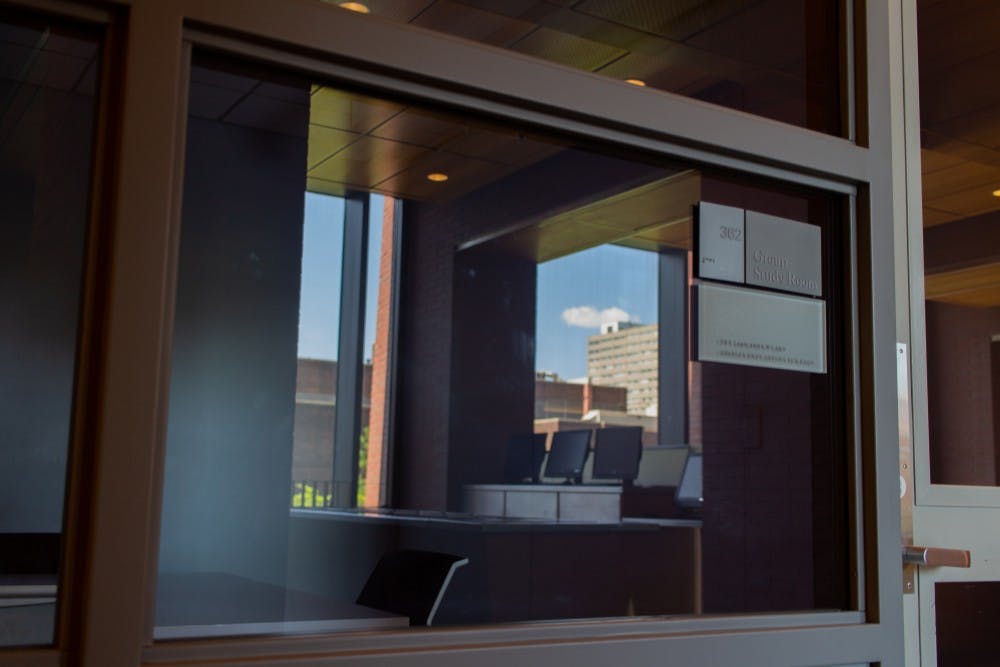
Wharton Dean Geoffrey Garrett has just announced that the days of pulling all-nighters at Jon M. Huntsman Hall have come to an end.
Credit: Biruk TibebeAt 4 a.m. on any day of the week, it's not uncommon to find Penn students hunched over desks in Huntsman Hall finishing problem sets, discussing strategies for a case competition, or even binge-watching reality television. It's a hallowed Penn tradition — but one that will no longer exist starting this semester.
As of Aug. 26, Huntsman Hall, which was previously open 24 hours a day, will close every night at 2 a.m. and reopen at 7 a.m. the next morning. This change is part of a larger effort to improve wellness among Wharton students, Wharton Dean Geoffrey Garrett wrote in an email sent out on Aug. 23.
"The idea was to really emphasize student wellness. We want students to go home at a reasonable hour and sleep," Director of Wharton Student Life Lee Kramer said. "We're hoping this is a positive step for campus and that students will be receptive to it."
Kramer added that the building will be open 24 hours every day from the start of reading days until the end of finals.
On top of changing Huntsman's operating hours, the business school is hiring a new associate director to help undergraduate students "experiencing acute academic and personal challenges," according to a job listing on the recruiting website, HERC.
It will also open a new Mindfulness Space in the second floor Quiet Study Lounge, which will be open for all Wharton students to use for quiet meditation or prayer. The Mindfulness Space will not require reservations.
Wharton's push to improve conditions around students' mental health comes amid a wider University initiative to boost wellness. In this past year alone, Penn has created a new wellness portal, held campus-wide conversations on mental wellness, conducted an operational review of Counseling and Psychological Services, and hired a Chief Wellness Officer for the University.
College senior Morgan Savige, who was informed about the new hours by a Huntsman security guard on Tuesday night, said she did not think reducing access to study spaces was an efficient way to address mental health on campus.
“There’s a mental health pressure from other things on campus that causes people to take advantage of the 24-hour-access," Savige said. "Reducing the access I don’t think would change the problem that exists.”
To improve student wellness, Wharton's Huntsman Hall will no longer operate 24 hours.
Huntsman Hall was among the last buildings on Penn’s campus that offered 24-hour study spaces to students. The Undergraduate Study Center in the Van Pelt Library basement operates for 24 hours a day from Monday to Thursday throughout the semester and every day during reading days and final exams.
Other late-night study spots include the main section of Van Pelt Library, which is open until 12 a.m. from Sunday to Thursday and 9 p.m. on Friday and Saturday. From Nov. 29 to Dec. 19, Van Pelt remains open until 2 a.m. for exam season.
Huntsman Hall officially opened in 2002 after three years of construction. At the time, Wharton spokesman Mike Baltes cited the creation of group study rooms as one of the prominent components of the $140 million building.
Have thoughts on Wharton's efforts towards improving wellness? Share them with us at letters@thedp.com or newstip@thedp.com.
In 2004, students reported that the popularity of Huntsman’s 57 group study rooms, commonly referred to by students as "GSRs," created a competitive and stressful environment. Students who utilize these GSRs to study for midterms, prepare for interviews, or meet with peers for group projects said the demand for study rooms is constant and, particularly during exams, extends into the early morning.
The study rooms at Huntsman have also traditionally been an area of contention between Wharton students and students from other Penn schools, seeing as only students registered to Wharton have the ability to reserve the highly coveted study rooms for 90 minute time slots.
Huntsman GSRs recently underwent a two year upgrade that was completed in 2016. Each GSR was outfitted with $10,000 worth of technology, including larger screens, wireless connection to student devices, and huge whiteboard walls. These resources, which made Huntsman an even more popular destination for students in recent years, will now no longer be available after 2 a.m.
“It’s a cultural thing at Penn that you can go to Huntsman at any time of day and people are always there," Savige said. "People should at least have the option of studying that late."
The Daily Pennsylvanian is an independent, student-run newspaper. Please consider making a donation to support the coverage that shapes the University. Your generosity ensures a future of strong journalism at Penn.
Donate




